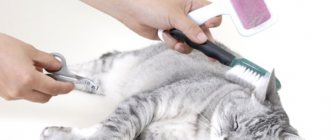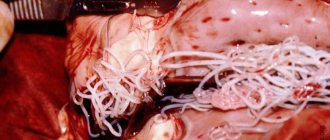How to worm a cat at home
If we take into account the rules and regulations, then only a veterinarian who has received such information from the test results as the type of parasites and lesions can carry out anthelmintic treatment. In addition, the doctor takes into account the fact that certain drugs affect a specific type of helminth, which allows him to choose the right treatment.
However, people often have to deworm cats at home, without qualified help. And the first thing you need to know if you find yourself in a similar situation is a list of medications suitable for deworming your pet:
- Pratel.
- Drontal.
- Trontsil.
- Milbemax.
- Polyverkan and others.
This is just a short list of medications suitable for deworming a cat at home. Below you can get acquainted with the best anthelmintics, and now we will reveal the nuances of using the drugs.
Antihelminthic drugs
In the arsenal of modern veterinarians there are a variety of means to rid a pet of worms. The release form of anthelmintic drugs can be presented:
- tablets;
- anthelmintic drops for internal use or external application;
- paste-like products;
- anthelmintic suspension;
- anthelmintic injections.
According to veterinarians, the most popular and highly effective means for deworming pets include:
- Drontal tablets;
- tablets "Kaniquantel";
- Milbemax tablets;
- drops for external use "Profender";
- drops for external use "Stronghold";
- suspension in a syringe dispenser “Prazicide”;
- instant solution "Polivercan".
The easiest way is to use external agents, as well as suspensions in syringes and so-called “sugars”, which quickly dissolve in water . Before use, the tablets are crushed, after which they are injected with a syringe into the cheek of a pet or mixed into minced meat.
Also, quite often the deworming tablet is placed at the very root of the tongue, which allows the pet to swallow it during natural swallowing movements.
Important! As a rule, the release form does not determine the level of effectiveness of the product, so when choosing a drug you should be guided by the recommendations of a veterinarian and personal preferences, as well as the type of active substance.
Return to content
How to use anthelmintic correctly
For preventive purposes, the modern drug is given once. It is advisable to hold the event in the morning. No preparation is required for the procedure.
If deworming is therapeutic in nature, then the drug is given twice, with an interval of ten days.
The cat must be dewormed if you plan to vaccinate the animal. This must be done ten days before the start of the procedure.
Drugs are also given to pregnant cats three weeks before lambing and the event is repeated five weeks after the birth of the offspring.
Dewormers should not be used on young kittens earlier than three weeks.
Folk remedies for deworming domestic cats
Various folk remedies can also be used for treatment and prevention. The most popular among breeders include:
- Sugar solution. If your pet refuses to drink sweet water, you can give it something to drink using a syringe.
- Fennel or chamomile in the form of a decoction. The infusion should be given to cats instead of water.
- Onion water. To obtain the infusion you will need an onion and a glass of boiled water. Chop the onion into water and let the mixture sit for one day. Give this water instead of regular liquid. The recommended duration of this home “treatment” is seven days.
- Infusion of common tansy. To obtain a decoction you need a tablespoon of flowers and a glass of boiling water. The decoction should be left to steep for one hour. You need to give your cat water three times a day, an hour before meals.
- Tincture of wormwood in alcohol. Dosage – 10 drops twice a day, an hour before meals.
- Enema based on carrot juice. Apply once a day. The duration of the procedure is seven days.
Tansy
Attention! The folk method of deworming a cat at home is for informational purposes only and is not a call to action. Cats are all different, each animal has its own body characteristics. And it is quite possible that the folk method that rid your neighbor’s cat of worms will not be successful in your case. What’s worse is that your pet may get poisoned or have a gastrointestinal disorder.
How often should a domestic cat be wormed?
Some cat lovers generally believe that domestic cats do not need to be dewormed in principle. They motivate this by the fact that the animal has nowhere to become infected. However, this is a common misconception. Worm eggs can get on the cat almost with dust. So, they can be brought into living quarters from the street on the sole of a shoe. Another source of infection can be food. This is especially true for cats whose diet includes natural products.
In general, you need to worm your domestic cat. But how often depends on the situation.
How often to worm a domestic cat for preventive purposes?
For preventive purposes, cats and females who have reached the age of one month are dewormed. Such manipulations can be repeated three times a year. This is a normal time interval for a domestic cat. If the cat is indoor, but sometimes goes outside, the frequency of preventive measures can be increased to once a month.
Important point! After the animal turns one year old, for the purpose of prevention, it is enough to give anthelmintics twice a year.
As you understand, all the indicated periods are relative values. Much depends on the cat’s environment, methods of caring for it, characteristics of the breed, etc. In addition, the detection of parasites is an immediate disruption to the established deadlines for planned deworming. A sick cat should be dewormed immediately. Remember, the medicine kills living individuals and does not affect helminth eggs. Therefore, after ten days (the period of ripening of worm eggs), the young generation of parasites should be “finished off” with a new portion of the anthelmintic drug. The dosage of the medicine in both cases should be the same.
Routes of infection
There are several ways pets can become infected:
- parasite eggs entering the house on the owner’s shoes;
- consumption of meat or fish that has not passed veterinary control and has not been subjected to heat treatment;
- eating a contaminated product (for example, contaminated feed);
- accidental ingestion of a flea - a carrier of the larval form of the helminth;
- eating an infected game object (rats and mice);
- infection of offspring from the mother.
Infection with helminths occurs regardless of the temperature and season of the year, although in summer the frequency increases. This should be taken into account when choosing a deworming regimen for your cat. Fish, fleas, and mice are intermediate hosts; in them, the helminth passes through all stages except the sexually mature one. The cat is the final host, in which the parasite becomes an adult and begins to actively reproduce.
Anthelmintic for cats – which is better?
The debate on the topic of the best anthelmintic for cats does not stop for a minute. The subject of discussion is the effectiveness of this or that remedy, the likelihood of counterfeiting the drug, and the high price of anthelmintic for cats.
All these, of course, are significant factors, but the essence of the problem lies in the degree of harm to the animal’s body. After all, every cat owner wants an effective and safe product for their pet. Let's look at the most popular anthelmintic drugs on the veterinary market:
- Milbemax - reviews about the product are the most positive. The main disadvantage is the narrow spectrum. This is an excellent anthelmintic for domestic cats, but for those who like to walk, it is better to choose something stronger. It should also not be given to kittens under the age of 1.5 months.
- Prazitel, Prazicide, Drontal - they are all popular, but rather weak drugs with a narrow spectrum of action. They may not cure a cat picked up from the street. But this is not the main disadvantage. The lack of drugs lies in their popularity. They are often counterfeited, and counterfeit products are often low quality and toxic, which can kill a cat. Although Drontal is classified as an anthelmintic for pregnant cats, and this is a clear plus.
- Dirofen. The tablets gained popularity due to such qualities as versatility and good effect. Although kittens under 1.5 months are not given the drug.
- Profender. As in the previous case, it is not suitable for small cats and cats. Type of drug: drops on the withers. The effect of use is good and quite gentle. The amount of product to be applied is calculated taking into account the weight of the pet.
- Vacation. One of the most gentle medicines. Thanks to this property, it is prescribed even to small, three-week-old kittens.
When purchasing any of the above drugs, be careful. After all, the market for counterfeit anthelmintics is developing successfully. Ask sellers for product certificates, and do not hesitate to study the product packaging before purchasing. Remember, the price for a high-quality anthelmintic for cats cannot be too low. Also, do not buy drugs from unreliable sources, such as free bulletin boards or underground passages.
You can now view the current price for anthelmintic drugs and buy them right here from Yandex Market with fast delivery:
Symptoms of the presence of worms
Any disease has stages of development. To prevent the disease from progressing, symptoms must be identified by observing and examining the cat. Here are several criteria that can confirm the presence of a parasitic disease:
- rare but severe cough;
- lack of appetite;
- causeless weight loss;
- bowel movement with bloody discharge;
- specimens of parasites in feces;
- bloating (inflammation in the small intestine);
- hard abdominal cavity;
- microflora disturbance;
- diarrhea (worms produce prostaglandin particles, which cause watery diarrhea).
In advanced cases, to the already mentioned symptoms, new ones are added, which have an even more significant effect on the overall health of the animal:
- insufficient bowel movements (parasites irritate the intestines and interfere with the absorption of fats and other substances, thereby forming a buildup in the colon and, as a result, constipation);
- high temperature (the body is trying to kill parasites);
- allergies (helminths can locally destroy the intestines, as a result of which food particles enter the blood and cause inflammation);
- a significant decrease in activity (due to a deficiency of nutrients in the body, which cease to be absorbed with the appearance of parasites);
- violation of the skin (a large number of worms in the body provokes the appearance of rashes, boils, ulcers, etc.);
- pale eyes;
- brightening of the oral cavity;
- muscle and joint pain (worms can migrate, in this regard, muscle tissue is injured and the immune system begins a fight, which results in inflamed muscles);
- pain in the liver (happens when helminths form a plug in the bile duct).
IMPORTANT! Worms greatly weaken cats and if left untreated, the animal can die. Death occurs due to intestinal rupture. And the rupture occurs due to blockage.
Diarrhea in a cat after deworming
People often hear that antiparasitic drugs are the cause of diarrhea in cats, poisoning and other ailments, including death. Naturally, every drug is toxic to some extent, but the main problems arise not because of the chemical component of the product, but because of an erroneous dosage or an incorrectly selected product. Regarding diarrhea in a cat after deworming, this is a completely different story. Typically, diarrhea is caused not by drugs, but by dead, decaying parasites. And for a cat, diarrhea in this case is a natural way to cleanse the intestines of dead worms.
You can also contact our site's staff veterinarian, who will respond to them as soon as possible in the comment box below.
How to properly deworm a cat yourself
If there are several cats in one room at once, then deworming is performed for all of them at the same time. Before the procedure, pets are checked for fleas. First you need to get rid of them. Fleas quickly transmit helminthic eggs. As a result, prevention and treatment are ineffective.
It is not recommended to select medications on your own. Especially if the cat has bloating, vomiting with foam, and parasite larvae are visible in the feces. These are signs of poisoning of the body with waste products of parasites. Incorrectly selected medications in this case can cause the death of the pet.
How to give your cat deworming tablets:
- The medicine must be prepared in advance so that the cat does not see it.
- Wrap your pet in a blanket or towel with one head sticking out.
- Take the cat by the head with your thumb and forefinger (cover your face with your palm). With your other hand, pull back the lower jaw.
- Place the tablet in your mouth (on the root of your tongue). Raise the head and hold it until the cat swallows the medicine. At the same time, stroke her throat, causing a swallowing reflex.
- The pet may try to spit out the tablet. Therefore, you need to hold the cat until the owner is sure that the medicine has been swallowed.
You can use other methods as well. For example, crush a tablet and add it to food. Stuff the pill into a meatball, a lump of cottage cheese or other delicacy. You can dissolve the tablet in water and put it into a syringe. Then fix the position as indicated above and pour the solution into the cheek.











